Jeff Marlow Published in PNAS
Assistant Professor of Biology Jeff Marlow has published a new paper titled "Carbonate-hosted microbial communities are prolific and pervasive methane oxidizers at geologically diverse marine methane seep sites" in the Proceedings of the National Academy of Sciences. You can read more about this research here and here.
Daniel Segrè and Melisa Osborne Featured in the Brink
Dr. Daniel Segrè and Dr. Melisa Osborne were recently featured in The Brink for their article "Non-additive microbial community responses to environmental complexity," which was published in nature communications this spring. An excerpt of The Brink article is below:
There’s a lot of interest right now in how different microbiomes—like the one made up of all the bacteria in our guts—could be harnessed to boost human health and cure disease. But Daniel Segrè has set his sights on a much more ambitious vision for how the microbiome could be manipulated for good: “To help sustain our planet, not just our own health.”
Segrè, director of the Boston University Microbiome Initiative, says he and other scientists in his field of synthetic and systems biology are studying microbiomes—microscopic communities of bacteria, fungi, or a combination of those that exert influence over each other and the surrounding environment. They want to know how microbiomes might be directed to carry out important tasks like absorbing more atmospheric carbon, protecting coral reefs from ocean acidification, improving the fertility and yield of agricultural lands, and supporting the growth of forests and other plants despite changing environmental conditions.
Read the full article here.
Tina Barbasch Receives 2021 Belamarich Award
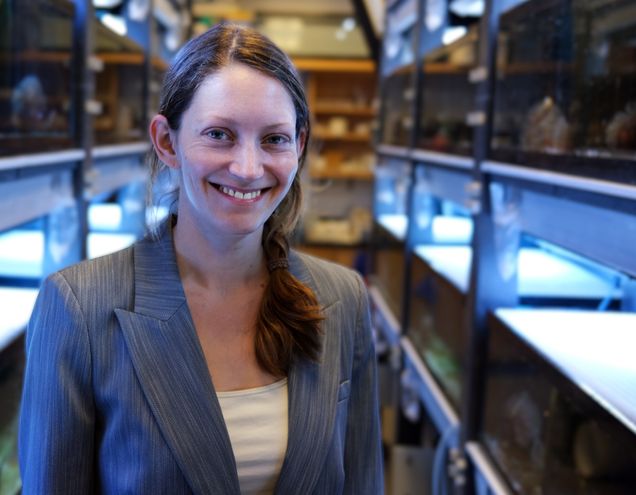
Dr. Tina Barbasch of the Buston Lab was selected as the winner of the 2021 Belamarich Award for her doctoral dissertation in Biology titled “How Do Parents Respond to Changing Ecological and Social Environments: Insights from a Coral Reef Fish with Biparental Care.” This award is given annually to a recent PhD candidate for their outstanding doctoral dissertation completed in the Department of Biology. Tina's dissertation was outstanding due to the impact and novelty of her work, including its interdisciplinary nature. Tina’s ability to combine theory and experiment was remarkable, putting her in a great position to receive a postdoctoral fellowship award. It was clear from her application that a broad community of scientists felt that her work was particularly groundbreaking. Tina’s productivity, creativity, and inventiveness propelled her lab’s research program in a new direction. In addition, her success as dual educator-researcher during her dissertation impressed faculty from across Biology. More information about her research is below.
Parents can go to incredible lengths to improve the survival of their offspring, but providing care comes at the expense of other activities, such as foraging and investing in future reproductive opportunities. Tina's dissertation research used the clown anemonefish as a study system to explore the environmental and social factors influencing how much care parents provide to their offspring. She combined laboratory and field manipulations with theoretical models to create a framework for understanding how and why parents provide costly parental care. This research ultimately contributes to our ability to predict how individuals and populations will respond to environmental changes. Next, she plans to explore how the parental brain manages the multiple, competing demands that accompany parenting.
Tina will begin an NSF postdoc this September at the University of Illinois Urbana Champaign in the lab of Dr. Alison Bell to study the genomics of parental care.
More about the Belamarich Award:
Frank A. Belamarich joined the BU Biology Department in 1963 as an assistant professor where he quickly gained international recognition for his research in the field of comparative hemostasis, the process of blood clotting. Throughout his tenure at BU he was a popular teacher of a core course in cell biology which he developed. Belamarich maintained research laboratories in Boston as well as at the Marine Biological Laboratory at Woods Hole in Falmouth, MA as part of the BU Marine Program.
Congratulations, Tina!
James Fifer and Brenna Stallings Receive Dana Wright Fellowship
James Fifer, PhD candidate of the Davies Lab, and Brenna Stallings, MS student of the Rotjan Lab, are recipients of the 2021 Dana Wright Fellowship.
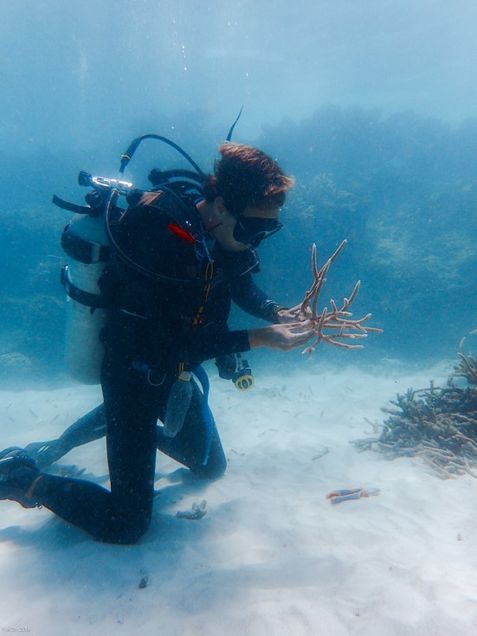
James is interested in investigating genomic signatures of latitudinal adaptation in several different coral species. He is employing physiological and population genetic tools to answer these questions. His current work focuses on the recent range expansion of a tropical coral, Acropora hyacinthus, into waters surrounding temperate mainland Japan. He is also looking at both temperature preference and population connectivity of the temperate coral Astrangia poculata throughout its extensive range (from Texas to Massachusetts) and the tropical corals Pocillopora verrucosa and Goniastrea edwardsi across the islands of the Marianas Archipelago. Understanding connectivity between coral populations and adaptation to local temperatures will help predict future coral distributions under a changing climate.
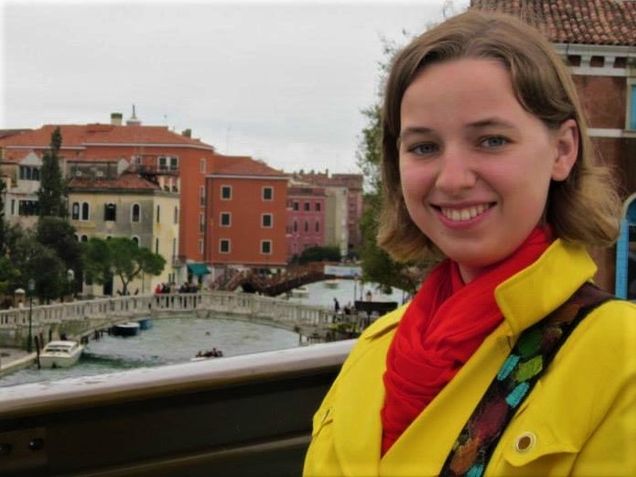 Brenna’s research focuses on investigating the role of a fast-growing Pacific coral, Montipora aequituberculata, and its role in facilitation and succession of coral reefs. Her work is done using data collected in the Phoenix Islands Protected Area and makes use of photomosaics, which are composite images of the reefs. By tracing individual corals across time, she can learn which corals survive and grow and which colonies die off. This will help her to determine if M. aequituberculata can benefit other species by acting as a placeholder, allowing more slowly growing species to become established, or if M. aequituberculata outcompetes other species and dampens biodiversity. This work is part of a larger project with collaborators in other labs to track the trajectory of coral reefs across time and answer overarching questions about resiliency and reef dynamics.
Brenna’s research focuses on investigating the role of a fast-growing Pacific coral, Montipora aequituberculata, and its role in facilitation and succession of coral reefs. Her work is done using data collected in the Phoenix Islands Protected Area and makes use of photomosaics, which are composite images of the reefs. By tracing individual corals across time, she can learn which corals survive and grow and which colonies die off. This will help her to determine if M. aequituberculata can benefit other species by acting as a placeholder, allowing more slowly growing species to become established, or if M. aequituberculata outcompetes other species and dampens biodiversity. This work is part of a larger project with collaborators in other labs to track the trajectory of coral reefs across time and answer overarching questions about resiliency and reef dynamics.
This fellowship was established in memory of Dana Wright (CAS ’00), an alum of the BU Marine Program. After completing her studies, Wright went on to work in research in right whale acoustics at the Woods Hole Oceanographic Institution on Cape Cod.
Congratulations, James and Brenna!
Sarah Davies Featured in The Brink
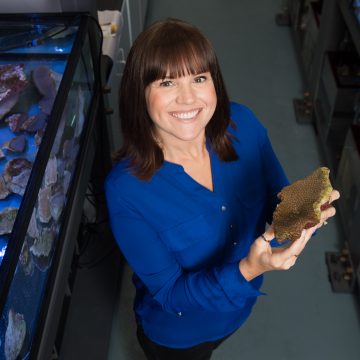
Dr. Sarah Davies was recently featured in The Brink's article, "Sexism and Racism in Science: How the Coronavirus Pandemic Exposed Everything." The Brink interviewed Dr. Davies about her new PLOS Biology paper, "Promoting inclusive metrics of success and impact to dismantle a discriminatory reward system in science." The paper is the product of a collaboration between Dr. Davies and 23 others, including BU's Dr. Wally Fulweiler, Dr. Colleen Bove, and Dr. Hanny Rivera. An excerpt of The Brink article is below:
In science, career progress—or lack thereof—is typically determined by certain criteria, such as how often a researcher’s studies are cited by other scientists, and by the number of papers they publish in prestigious, high-impact scientific journals (which often comes with an expensive price tag paid by a paper’s authors). Those metrics, however, are biased against already marginalized groups in science—namely, those who don’t identify as white males—and ensure that sexism and racism continue to plague the field, according to 24 researchers who have penned a new PLOS Biology piece on the topic.
Sarah Davies, the piece’s co-lead author and a Boston University College of Arts & Sciences assistant professor of biology, says the time crunch and workload created by the coronavirus pandemic was a tipping point for many marginalized researchers. “I’ve never been busier, so it was an interesting choice to take on a ‘perspectives’ piece outside my field of [marine biology] research,” she says. “But the coronavirus pandemic created the perfect storm of being ‘over it.’” For Davies, that meant the daunting task of navigating a changing work and research environment while juggling childcare amidst the pandemic.
Read the full article here.
2021 Dr. Marion R. Kramer Scholarship Winners
The Department of Biology is excited to announce the three recipients of this year’s Dr. Marion R. Kramer Scholarships: Nicola Kriefall of the Davies Lab, GPN PhD student Lisa Kretsge of the Cruz-Martin Lab, and Zoey Werbin of the Bhatnagar Lab.

Nicola Kriefall is interested in understanding how reef environments affect corals and their symbioses with microscopic organisms. Conditions on the reef change depending on the scale that you examine - sites just a few meters apart can have vastly different temperatures and salinity changes day to day. The first and second chapter of her dissertation compare the algal and bacterial communities hosted by corals across environments located closer to shore (typically more variable in terms of conditions like temperature) and further from shore (typically more stable) in French Polynesia and in Florida (USA). Her third chapter is a tank experiment that isolates daily thermal variability from other factors that differ across reef environments and asks how this variation structures coral microorganismal communities. By asking these types of questions, she aims to better understand whether microbes can play an important role in coral acclimatization to environmental shifts under climate change.
 Lisa Kretsge is a PhD candidate in the Graduate Program for Neuroscience working in the Cruz-Martin laboratory. Her research aims to better understand how the cortex is able to encode such diverse, behaviorally-relevant information. She uses calcium imaging and miniaturized microscopes to record neural activity with cellular resolution in awake, behaving mice. Lisa is particularly interested in a specific type of inhibitory interneuron (VIP cells) in the anterior cingulate cortex (VIP-ACC). Her data shows that VIP-ACC cells are functionally heterogeneous: distinct subpopulations preferentially activate either to anxiety-related, social, or non-social stimuli. This informs our understanding of how VIP-ACC cells function during behavior and how a given cortical region can encode diverse types of information.
Lisa Kretsge is a PhD candidate in the Graduate Program for Neuroscience working in the Cruz-Martin laboratory. Her research aims to better understand how the cortex is able to encode such diverse, behaviorally-relevant information. She uses calcium imaging and miniaturized microscopes to record neural activity with cellular resolution in awake, behaving mice. Lisa is particularly interested in a specific type of inhibitory interneuron (VIP cells) in the anterior cingulate cortex (VIP-ACC). Her data shows that VIP-ACC cells are functionally heterogeneous: distinct subpopulations preferentially activate either to anxiety-related, social, or non-social stimuli. This informs our understanding of how VIP-ACC cells function during behavior and how a given cortical region can encode diverse types of information.
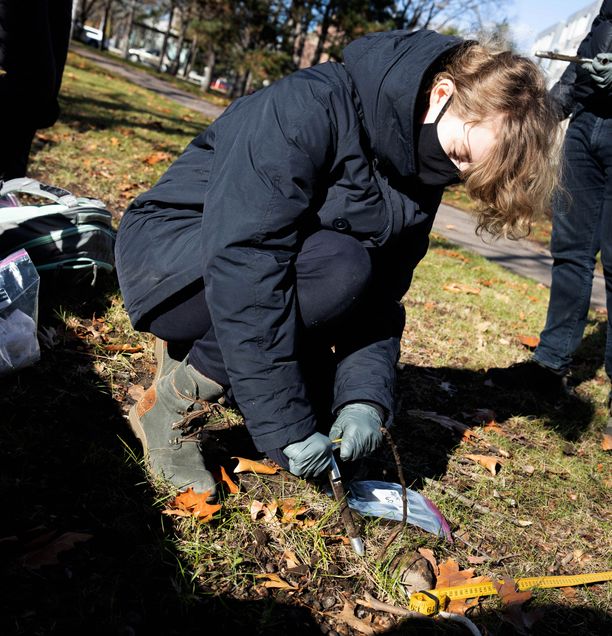 Zoey Werbin's research focuses on the diverse communities of micro-organisms that live in soil. Soil fungi and bacteria are responsible for cycling important nutrients like carbon and nitrogen, and different organisms work together to carry out biogeochemical functions. Zoey built models of these communities to forecast how microbes respond to abiotic conditions like soil chemistry, temperature, and moisture. She is currently developing metabolic network models to explore the role of species interactions within soil biogeochemical cycles. Overall, her work aims to help elucidate the complex and mysterious relationships between soil microbes and environmental change.
Zoey Werbin's research focuses on the diverse communities of micro-organisms that live in soil. Soil fungi and bacteria are responsible for cycling important nutrients like carbon and nitrogen, and different organisms work together to carry out biogeochemical functions. Zoey built models of these communities to forecast how microbes respond to abiotic conditions like soil chemistry, temperature, and moisture. She is currently developing metabolic network models to explore the role of species interactions within soil biogeochemical cycles. Overall, her work aims to help elucidate the complex and mysterious relationships between soil microbes and environmental change.
This award provides support for high-achieving female students majoring in Biology. The award was established in 2001 in honor of Dr. Marion Kramer who earned her Bachelor’s degree in Biology from Boston University in 1963 and went on to a long and satisfying career in biology and medicine.
The Department of Biology gives this award to graduate students in the spring, and to undergraduate students in the fall. Read about our Fall 2020 undergraduate recipients here.
Congratulations, Nicola, Lisa, and Zoey!
Caroline Fleming Receives 2021 I. Alden Macchi Award

Caroline Fleming, Biology PhD student of the Rotjan Lab, was selected as the winner of the 2021 I. Alden Macchi Award for excellence in the field of regulatory biology. Read more about Caroline's research below!
Marine organisms located downstream from urban centers face potentially negative interactive effects from pollutants (heavy metals, microplastics, pharmaceuticals, increased nutrients) and global change stressors (increasing sea temperature and acidity). Corals are just one example of a marine urban organism that may be vulnerable to these stressors. One seemingly resilient urban coral is Astrangia poculata, which exists along the eastern United States coast from Massachusetts to Florida at a range of temperatures and conditions, including the New York Harbor. Though it appears to be surviving in these habitats in the field, it is unclear if the coral will be resilient to the impacts of urban pollutants and global sea surface temperature increases, or how different life history stages will respond. Caroline will be conducting an experiment on the effects of microplastics (pollutant vector) and caffeine (pollutant indicator) under normal and elevated temperatures on the metabolic activity of the urban coral A. poculata in three life stages: adults, larvae, and eggs. Understanding the effect of these stressors on early life stages (egg and larvae) will allow researchers to evaluate whether urban pollutants or increased temperatures will reduce coral fecundity and fitness, which may ultimately lead to population reductions. A. poculata individuals will be exposed to field-measured and elevated levels of caffeine (ng/uL), microplastics, and combinations thereof simultaneously with ambient (22°C) and elevated (30°C) temperatures. Metabolic activity (measured via oxygen consumption on a respirometer) was used as a read-out to determine sublethal response to stressors. Overall, Caroline aims to establish dose-response relationships for each stressor (caffeine, microplastics, and temperature) and combination thereof at each life stage, providing insight into the sensitivity threshold of this resilient urban marine organism.
This award was established by the late I. Alden Macchi, Professor and former Interim Chairman in the Department of Biology. Dr. Macchi received his PhD in Endocrinology from BU in 1954. Professor Macchi’s research contributed, among other things, many important observations regarding the mechanisms of steroid hormone biosynthesis in the adrenal glands.
Congratulations, Caroline!
Amanda Pinheiro Recipient of 2021 Kilachand Fellowship

Amanda Pinheiro, MCBB PhD student of the Naya Lab, is a recipient of a 2021 Kilachand Fellowship. This fellowship is funded by the Biological Design Center's Multicellular Design Program (MDP), which combines research in Synthetic Biology, Microbial Engineering, Tissue Engineering, Data Science, and Biophysics to understand the design principles of multicellular systems. Amanda will be working on a project entitled “Elucidating Complex Cell-Cell Interactions in the Regenerative Skeletal Muscle Microenvironment.”
Congratulations, Amanda!
Isabella Muratore Receives Inaugural Belamarich Dissertation Writing Award

Isabella Muratore of the Traniello and Mullen Labs is the recipient of the inaugural Belamarich Dissertation Writing Award. This award complements the Belamarich Award, and is given to support an outstanding PhD student through the dissertation writing stage.
Isabella's research focuses on the following question, "What selective forces and molecular mechanisms govern the integration of worker body size and morphology, brain architecture, and behavior in insect societies?" In order to address this question, Isabella studies the socially complex fungus-growing leafcutter ant Atta cephalotes, a species that exhibits a striking agricultural division of labor based on worker polymorphism. To understand the influences of socioecological challenges on behavioral performance and brain evolution, she quantified worker morphological and behavioral variation. She found that mid-sized workers (“medias”) had the most diverse task repertories and serve dominant roles in leaf harvesting, whereas workers of other size classes performed fewer, more specialized behaviors. She also used variation among tasks in sensorimotor functions and task performance frequencies to create an estimate of sensory integration and processing demands across worker size groups.
After quantifying the volumes and of key areas in the brains of workers of different sizes, Isabella found that her estimate corresponded to proportional investment in the mushroom bodies, a brain compartment responsible for learning, memory, and sensory integration. Additionally, she measured whole-brain gene expression and identified significant differences in expression levels for numerous genes likely to underpin worker neurobiology and behavior. These results identify differentiation along morphological, neuroanatomical, behavioral, and molecular axes among A. cephalotes workers and the impact of advanced division of labor on brain evolution.
Congratulations, Isabella!
Brandon Güell Receives 2021 Thomas H. Kunz Award
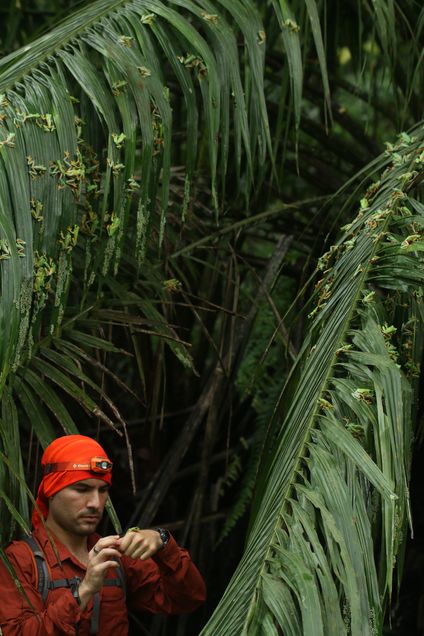
Brandon Güell of the Warkentin Lab is this year’s recipient of the Thomas H. Kunz Award. Brandon's general research interests are studying adaptive phenotypic plasticity, behavioral ecology, and predator-prey interactions of Neotropical frogs. His thesis work focuses on examining the behavioral ecology of gliding treefrogs, Agalychnis spurrelli, on Costa Rica’s Osa Peninsula and comparing their behaviors and ecology with closely related species. Brandon is currently determining the consequences of reproductive strategies, such as explosive vs. prolonged breeding, on adult reproductive behaviors and embryo-predator interactions.
This summer, Brandon is specifically testing whether egg-clutch structure affects the escape hatching behavior of embryos in two closely related treefrog species in response to predator attacks by conducting egg-transplant experiments. He is transplanting eggs of one species into the clutch of another and exposing them to snake predators to assess their escape rates within different egg clutch types.He's also continuing to monitor the explosive breeding population of gliding treefrogs on the Osa Peninsula, with the goals of describing their reproductive phenology and determining their environmental triggers. Brandon's research will give us a better understanding of how sexual selection and reproductive strategies affect adult and embryo behaviors of tropical, terrestrial-breeding frogs.
This award provides support for Ecology, Behavior & Evolution (EBE) PhD candidates who have completed the qualifying exam, with a preference for those conducting field research in the award year. The award was established in 2015 in recognition and appreciation of Professor Thomas H. Kunz’s mentorship. His current and former graduate students established this award to serve as a lasting legacy of Tom’s contributions at BU and beyond. Learn more about Dr. Kunz and how you can support this award.
Congratulations, Brandon!
